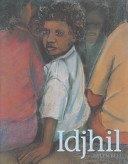Set in the Swan Valley area of Western Australia (an outer metropolitan area of Perth), ‘Idjhil’ is a moving picture book story of a young boy who is forcibly removed from his family in accordance with the official Australian Government policy of the time, the ‘1905 Aborigines Act.’ Based on the memories and experiences of those who lived in the area during the 1940s, this fictional account opens with an excited nine-year-old Idjhil hunting for kangaroo with his father and grandfather, while his mother and the other women go in search of bush tucker. Co-existing with the developing urbanisation, Idjhil and his family live on the outskirts of town. Their way of life in bush camps, with children learning about country, hunting and bush skills from their elders feature. Increasing tensions between the Aboriginal community and the ‘wadjallahs’ (white men) escalate when Idjhil and his brothers are taken from their family to live in a mission home in Mogumber.
The poetic text which includes references throughout to Noongar language is enhanced with full page colour illustrations in rich pastels and charcoal, full of expression and emotion and an attention to detail in depicting the flora and fauna of the Australian bush. In the Introduction, non-Indigenous author and illustrator, Helen Bell, acknowledges Cedric Jacobs, a Swan Valley Elder, as having provided the background information for the story. Reverend Cedric Jacobs was awarded an MBE in 1981 for his work amongst Aboriginal people.
Also detailed is a brief history of the impact of British Settlement resulting in the claiming of fertile hunting grounds of the Noongar people, through to the deliberate decimation of family through the Act which gave the ‘Chief Protector of Aborigines’ power to place children of Aboriginal descent in settlements.
In 1996, ‘Idjhil’ won the Western Australian Premier's Book Award (Children's and Young Adult's Books Award).

